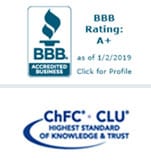
2018: the year of tax reform, market volatility, and tariffs is now also the year of millionaires. A recent Fidelity Investments report found that a record-breaking 157,000 Fidelity 401(k) savings accounts now have balances at or above the $1 million mark—49,000 more than claimed millionaire status in 2017. For a growing number of Americans, a seven-figure 401(k) is more than just a pipedream. Here’s how you get there:
1. Collect the Company Match
According to USA Today, about 75% of companies that offer employees a 401(k) retirement plan also offer to make a matching contribution. The problem? Twenty percent of workers don’t contribute enough to get the company match. The first step to claiming your match, if your company offers it, is to understand the requirements. Matching formulas vary, but the most common match is a fixed match, often dollar for dollar on the first 6% of the employee’s contributions. We recommend you put 10-15% of every paycheck into your 401(k). At the very least, you should be contributing enough to get the company’s match.
2. Automate Contributions
We’ve all been there at the end of the month; after car payments, utilities, cell phones, cable, and those too-good-to-give-up after work margaritas at your favorite Tex-Mex place, you’re getting by on leftover fajitas and the scraps of your last paycheck. You know you should be saving more, but it just keeps slipping your mind. Don’t depend on memory: set up automatic contributions directly from your paycheck to your 401(k) or another retirement account. That way, the money goes right where you want it before you’re tempted to spend it. We also suggest setting aside an additional 1-2% every 6-12 months. This tiny increase won’t make a noticeable difference in your checking account, but it will in your savings! If you’re feeling skeptical, run the numbers on this 401(k) calculator.
3. Avoid Penalties
Younger than 59 ½? Don’t touch that 401(k) money! The IRS not only taxes 401(k) withdrawals as regular income but tacks on a 10% penalty if you’re underage. If you are considering a 401(k) withdrawal, consult a financial professional to help you find a workable alternative. On the other side of the equation, if you’re over 70 ½, failure to make a withdrawal (or required minimum distribution), will also land you with a penalty.
4. Fight the Urge to Splurge
Facebook ads, Amazon deals, “special offer” emails; the treat yourself era encourages us to live (and spend!) in the moment, but when you’re saving for retirement, it’s important to strike a balance. Look closely at your budget—how much is left at the end of the month? How much of that should you invest in your retirement? A solid financial plan will help you stay on track.


Edited by: Sara McKinney
saractag@gmail.com
Sara is a recent graduate of Kalamazoo College and a new addition to the Cowen Team. Her responsibilities include IT support, event planning, and general administrative assistance.




